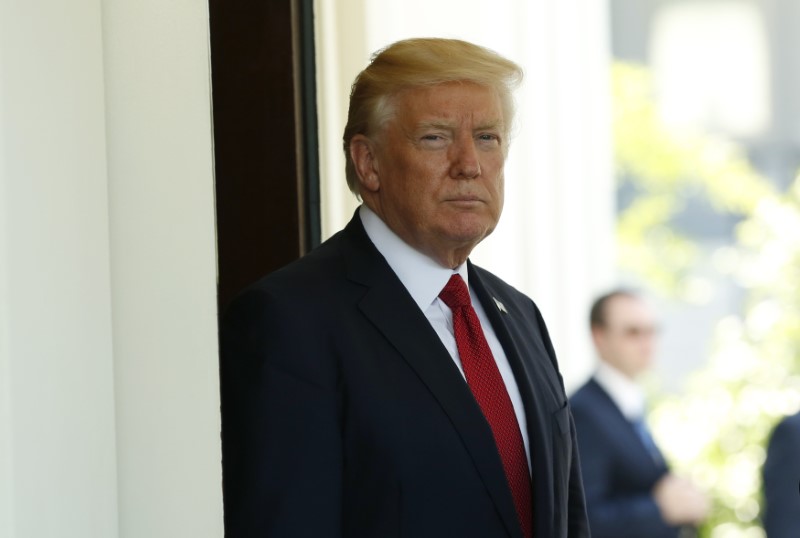By Doina Chiacu and Patricia Zengerle
WASHINGTON (Reuters) - President Donald Trump on Thursday assailed the Justice Department's appointment of a special counsel to investigate possible ties between his 2016 presidential campaign and Russia, calling it "the single greatest witch hunt" in U.S. history.
Trump's defiant Twitter comments stood in contrast to his measured statement on Wednesday night after former FBI chief Robert Mueller was named as special counsel, in which he said "a thorough investigation will confirm what we already know - there was no collusion between my campaign and any foreign entity."
Deputy Attorney General Rod Rosenstein appointed Mueller after a succession of jarring developments that brought to a boil questions over Russia's alleged meddling in the election and possible collusion by the Trump campaign.
They included Trump's firing of FBI Director James Comey, reports that Trump had previously pressured Comey to end a probe of former national security adviser Michael Flynn, and Trump discussing sensitive information on Islamic State with Russia's foreign minister.
In Twitter postings, the Republican president decried the naming of a special counsel, by an official he himself appointed.
"With all of the illegal acts that took place in the Clinton campaign & Obama Administration, there was never a special counsel appointed!" Trump wrote. He initially misspelled the word counsel as he referred to Democratic former President Barack Obama and former presidential candidate Hillary Clinton and corrected himself in a later tweet.
"This is the single greatest witch hunt of a politician in American history!" added Trump, who said in a speech on Wednesday that "no politician in history" had been treated worse or more unfairly than he has.
Democratic Senator Amy Klobuchar responded, "This is a truth hunt."
U.S. stocks rose as upbeat economic data emboldened investors to return to the market, a day after Wall Street saw the biggest selloff in eight months on worries the political turmoil could undermine Trump initiatives such as tax cuts that investors see as favoring economic growth.
Rosenstein, the No. 2 Justice Department official, named Mueller amid mounting pressure in Congress for an independent investigation beyond existing FBI and congressional probes into the Russia issue.
Democrats and Trump's fellow Republicans widely praised Mueller's appointment. But Senate Democratic Leader Chuck Schumer said Comey should still appear before congressional committees that have invited him to testify.
Top House Democrat Nancy Pelosi said an independent commission to investigate the Russia matter was still needed to guard against White House interference. Asked about Trump's tweets, she said the president should "get some thick skin."
A key issue Mueller may have to tackle is whether Trump has committed obstruction of justice, an offense that could be used in any effort in the Republican-led Congress to impeach him and remove him from office.
Trump cited displeasure with the FBI's Russia probe as a factor in dismissing Comey. In addition, Comey wrote a memo detailing Trump's comments to him in February saying "I hope you can let this go," referring to the Flynn probe, a source who saw the memo said on Tuesday.
Asked about the potential that there had been obstruction of justice, Republican House of Representatives Speaker Paul Ryan told reporters the special counsel will "follow the facts where ever they may lead" and that "it is premature to prejudge anything at this point."
Flynn's contacts with Russians during the campaign, as well as his work for the Turkish government, are under investigation. He was fired as national security adviser in February after it emerged he had misled Vice President Mike Pence about conversations with Russia's ambassador to Washington in December.
FLYNN CONTACTS
Flynn and other Trump campaign advisers were in contact with Russian officials and others with Kremlin ties in at least 18 calls and emails during the last seven months of the presidential race, Reuters reported on Thursday.
The chairman of the Senate Intelligence Committee, Republican Richard Burr, said Flynn's lawyer told the panel he would not honor its subpoena seeking relevant documents. Congressional aides said the panel was still negotiating with Flynn to obtain them.
The House Intelligence Committee requested more documents from the Justice Department and FBI related to its Russia probe.
Russia has denied U.S. intelligence agencies' conclusion that it interfered in the election campaign to try to tilt the vote in Trump's favor. Trump has long bristled at the notion that Russia played any role in his November election victory.
Kremlin spokesman Dmitry Peskov declined to comment on Mueller's appointment, calling it an "internal matter" for the United States.
Rosenstein was due to brief U.S. senators later on Thursday. Democratic Senator Joe Manchin said Rosenstein would be questioned about a letter he wrote accusing Comey of missteps as FBI director, including his handling of an election-year probe into Clinton's use of a private email server while she was secretary of state.
The White House initially said that letter prompted Trump to fire Comey, but Trump later said he had already decided to dismiss him and was thinking of "this Russia thing."

The Russia matter has consumed Washington and overshadowed Republican legislative priorities including a planned healthcare overhaul and sweeping tax cuts.